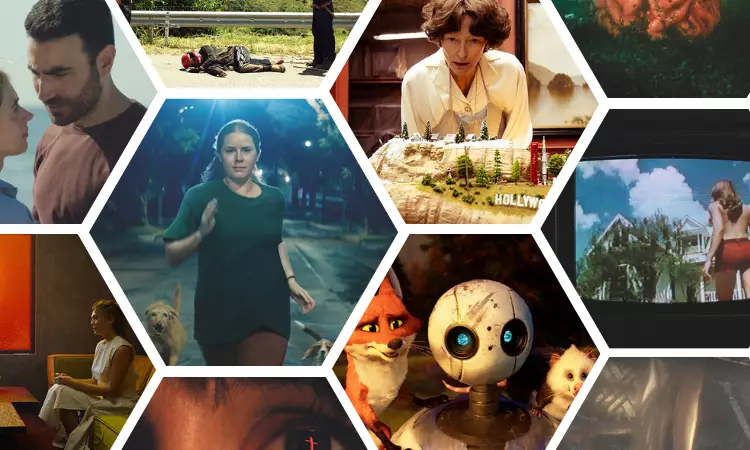The BFI London Film Festival (LFF) returns this October, celebrating its 68th edition with an exciting slate of films that push boundaries and provoke thought. Running from the 9th to the 20th, the festival showcases an impressive roster of cinematic talent hailing from all around the globe. As the audience gathers in London and across the UK, the festival promises a diverse mix of genres, narratives, and themes, ensuring a captivating experience for film enthusiasts.
A Star-Studded Cast and Unique Storytelling
This year’s festival boasts an array of genre films featuring some of today’s most talented actors, including Lupita Nyong’o, Pedro Pascal, Amy Adams, and Cate Blanchett. The festival is an arena not only for storytelling, but for exploring complex human emotions and societal issues through the lens of cinema. Take, for instance, “All of You,” a romantic drama directed by William Bridges. Set in a near-future where best friends navigate the emotional turmoil of unspoken love while dealing with the implications of a soulmate test, the film is a poignant reminder of the nature of connection and longing in our modern society.
Lupita Nyong’o leads “ROZZUM,” a narrative that weaves adventure with a touch of whimsy. The story follows the journey of a robot, Roz, cast away on an uninhabited island, illustrating how relationships transcend species and shape one’s identity. With a compelling premise and a talented voice cast, including Pedro Pascal and Catherine O’Hara, this film resonates with themes of adaptation and maternal instinct, making it a must-see.
The festival also introduces “Nightbitch,” with Amy Adams exploring the surreal experience of motherhood tethered with a descent into bizarre fantasy. This film, crafted by Marielle Heller, sheds light on domestic life’s haunting aspects, challenging societal norms around femininity and maternal roles. As life transforms into a fever dream of identity shifts, the film provides commentary on personal sacrifice as well as the surrealism underlying everyday experiences.
As the festival dives deeper into speculative narratives, “The End” directed by Joshua Oppenheimer territorializes a haunting musical future, where one family’s sheltered existence is interrupted by an unforeseen visitor. This film cleverly juxtaposes innocence with the discovery of the outside world, raising questions about utopia and dystopia in a seemingly perfect life.
Challenging Perspectives and Engaging Narratives
Another thought-provoking piece is “Chain Reactions,” which examines the legacy of Tobe Hooper’s “The Texas Chain Saw Massacre.” This documentary not only showcases the impact of a cult classic but also invites viewers to engage with the deeper cultural implications of horror films, making it a rich metafiction exploring trauma, influence, and art. Featuring insights from notable figures like Stephen King and Karyn Kusama, the film underscores how art shapes our understanding of reality.
Additionally, “Sister Midnight,” which illustrates a young woman grappling with her repressed tendencies in Mumbai, tackles themes of identity, societal expectations, and the whims of fate. Its comedic elements combined with social critique promise a refreshing take on the genre, encouraging audiences to ponder the absurdities of life.
The festival’s international offerings are equally enticing, with films like “Bury Your Dead,” which transports the audience to apocalyptic Brazil. Directed by Marco Dutra, this narrative delves into the intersection of survival and psychological struggle, presenting a raw view of human instincts heightened by environmental desperation.
Moreover, “Sanatorium Under the Sign of the Hourglass,” based on Bruno Schultz’s work, takes a figurative train ride through memory and myth, artfully merging elements of existential dread with a narrative steeped in nostalgia. Each film at the festival is a testament to filmmakers’ creativity and dedication to sharing unique stories, enhancing the significance of diverse voices in cinema.
This year’s BFI London Film Festival serves as a mirror to contemporary society, revealing both our fears and hopes through the art of film. From exploring emotional landscapes to commenting on social issues, the lineup encourages vibrant discussions about the human experience.
As we prepare for the screenings ahead, it’s clear that the festival not only entertains but also informs, pushing the boundaries of film as a medium for social reflection. Each narrative presented not only entertains but also pushes the envelope of how we think, feel, and engage with the world around us, leaving a lasting impact on its audience and cementing cinema’s place as a vital art form.
As we gear up for this year’s festival, expect not just an array of remarkable cinema but a collective journey that invites connection, introspection, and dialogue among audiences across the UK and beyond.

